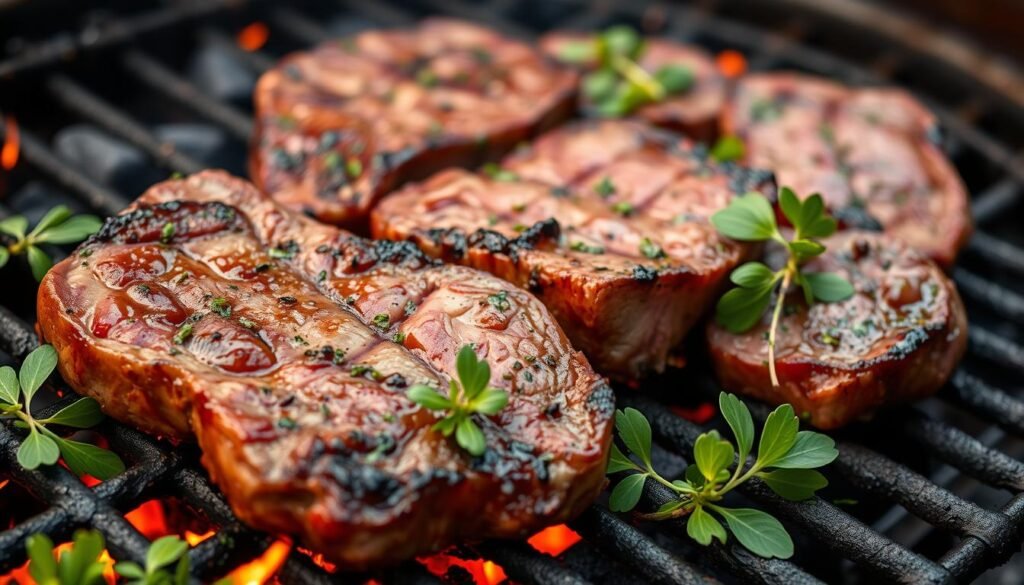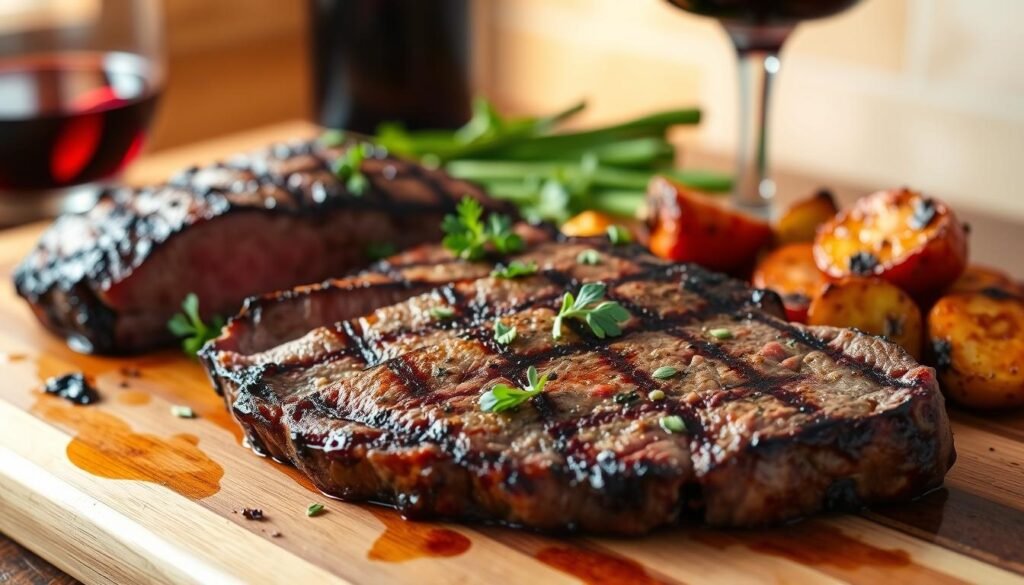I love cooking at home, and knowing how to cook beef strip loin steaks perfectly is a must for steak lovers. This guide will show you how to create a steakhouse-quality meal, whether you’re a pro at grilling or new to steak.
Strip loin, or New York strip, is tender and full of flavor. It has just the right mix of marbling and texture. When cooked right, it’s as good as any steakhouse. I’ll show you how to pick the best strip loin and cook it to perfection. Plus, I’ll share ideas for sides that go great with your steak. Get ready to wow your loved ones with your steak skills!
Understanding Strip Loin Steak Quality and Selection
Grilling or pan-searing steaks requires a high-quality strip loin steak. Knowing about the USDA grading, marbling, and choosing the right size is key. This ensures a flavorful and tender steak.
USDA Grades and Marbling Explained
The USDA grades beef into Prime, Choice, and Select. For the best taste and tenderness, choose USDA Prime or Choice steaks. These have more marbling, which makes the steak juicy and flavorful.
Choosing the Right Thickness and Size
A strip loin steak should be 1 to 1.5 inches thick. This thickness helps cook evenly, giving a great sear and a juicy center. Look for a steak with a fat cap of 1/4 to 1/2 inch. This fat helps keep the meat moist during cooking.
Fresh vs. Aged Strip Loin
Fresh strip loin steaks are common, but aged steaks are also available. Aging, whether dry-aged or wet-aged, makes the steak more tender and flavorful. Choose based on your taste and cooking method.

“Marbling, the intramuscular fat, contributes to juiciness and taste. Consider grass-fed for a bolder flavor or USDA Prime for tenderness and rich taste.”
Essential Equipment for Perfect Strip Steak
Learning to cook a delicious strip steak starts with the right tools. A seasoned cast iron skillet is key. It can handle high heat and keeps it well, perfect for a great sear.
A meat thermometer is also crucial. It helps you cook your steak to the perfect doneness. You’ll need sharp knives for slicing and heavy-duty tongs for handling the steak.
For the best steak, use a wire rack to rest it after cooking. This lets juices drain, making the steak more flavorful and tender.
With these tools, you’re ready to cook the perfect strip steak. Whether you’re experienced or new to cooking, these tools will help you achieve steak perfection.
| Essential Equipment | Why It’s Important |
|---|---|
| Cast Iron Skillet | Retains heat well, crucial for achieving a perfect sear |
| Meat Thermometer | Ensures accurate doneness for your desired steak |
| Sharp Knives | Allows for clean, precise slicing of the steak |
| Heavy-Duty Tongs | Handles the steak with care during cooking and plating |
| Wire Rack | Allows excess juices to drain, concentrating the flavor |
“A well-equipped kitchen is the foundation for cooking exceptional strip steaks at home. Investing in these essential tools will elevate your steak-cooking game to new heights.”
The Art of Steak Preparation and Seasoning
Getting your beef strip loin steaks just right is key to their flavor. We’ll cover the essential steps to make your steaks taste like they’re from a top restaurant.
Dry Brining Techniques
Dry brining makes your steaks tender and juicy. Rub coarse salt all over the steaks and refrigerate for 1 to 12 hours. This method pulls moisture to the surface, focusing the steak’s flavors.
Best Seasonings and Timing
Seasoning should be simple yet effective. Salt and black pepper before cooking are all you need. For more flavor, try garlic powder or smoked paprika, but don’t overdo it.
Room Temperature Guidelines
Let your steaks warm up to room temperature before cooking. This takes 30 to 60 minutes. It ensures even cooking and a better texture. Avoid cooking from the fridge to prevent unevenness.
| Steak Doneness Level | Internal Temperature Range |
|---|---|
| Rare | 120°F to 125°F (49°C to 52°C) |
| Medium-Rare | 130°F to 135°F (54°C to 57°C) |
| Medium | 140°F to 145°F (60°C to 63°C) |
| Medium-Well | 150°F to 155°F (66°C to 68°C) |
| Well-Done | 160°F and above (71°C and above) |
Mastering steak preparation and seasoning will help you make amazing strip loin steaks. They’ll impress your guests and satisfy your taste buds.
How to Cook Beef Strip Loin Steaks
Cooking the perfect beef strip loin steak is a two-step process. First, sear the steak on the stovetop to get a tasty crust. Then, finish it in the oven to get the right doneness.
Preheat your oven to a very hot 500°F. While that heats up, get a cast iron skillet hot over high heat. This high heat is key for a great sear on the steak.
When the pan is ready, add your strip loin steak. Sear it for 2-3 minutes on each side. This creates a delicious crust and keeps the juices inside.
After searing, put the skillet in the oven. Let the steak cook until it’s done to your liking, usually 2-6 minutes. Use a meat thermometer to check the temperature. Aim for 120°F for rare, 130°F for medium-rare, or 140°F for medium.
Remember, the steak’s temperature will go up a bit while it rests. So, take it out of the oven a little before your target temperature. This method ensures a great sear and a juicy steak.
“The key to cooking a great steak is to sear it at a high temperature and then finish it in the oven. This gives you the best of both worlds – a crispy crust and a deliciously juicy center.”
Pair your perfectly cooked strip loin with your favorite steak side dishes for a top-notch meal at home. Enjoy!
Cast Iron Skillet Method: Step-by-Step Guide
Learning to cook beef strip loin steaks is a big step up in cooking. The cast iron skillet method is a favorite for its perfect sear and juicy inside. Follow these steps to make sure your steaks are always a hit.
Preheating and Temperature Control
To get a great crust on your steak, start with the right preheat. Heat your cast iron skillet over medium-high for 5-7 minutes. It should be hot enough to start smoking.
Searing Techniques
When your skillet is ready, put the steak in the center. Sear it for 2 minutes on each side. Then, sear the fatty edge for 30 seconds. This helps keep the steak juicy.
Butter Basting Process
After searing, put the skillet in a 500°F oven for 3-5 minutes. Then, return it to the stovetop. Add butter and baste the steak for 1-2 minutes. The butter adds a rich flavor.
This method gives you a crusty outside and a tender inside. With practice, you’ll make amazing how to cook beef strip loin steaks and beef steak recipes like a pro.
| Steak Doneness | Internal Temperature | Cooking Time |
|---|---|---|
| Rare | 120°F | 3-5 minutes |
| Medium Rare | 130°F | 5-7 minutes |
| Medium | 135°F | 7-9 minutes |
| Medium Well | 140°F | 9-11 minutes |
| Well Done | 150°F | 11-13 minutes |
The cooking time can change based on the steak’s thickness and your desired doneness. Always check with a meat thermometer to get it just right.
Understanding Steak Doneness Levels
Cooking the perfect beef strip loin steak means knowing about steak doneness levels. The internal temperature of the steak shows how done it is, from rare to well-done. A meat thermometer helps you get your steak just right.
- Rare: 120-125°F – Cool red center
- Medium Rare: 130-135°F – Warm red center with a pink band
- Medium: 140-145°F – Mostly pink center
- Medium Well: 150-155°F – Slight pink center
- Well Done: 160-165°F – Brown throughout
The USDA says steaks should be at least 145°F for safety. But many prefer the taste of a medium rare steak, with a temperature of 130-135°F. It’s tender and flavorful.
| Doneness Level | Internal Temperature Range | Appearance |
|---|---|---|
| Blue Rare | 115°F | Completely uncooked, cool red center |
| Rare | 120-130°F | Cool, red center |
| Medium Rare | 130-135°F | Warm, red center with a pink band |
| Medium | 140-145°F | Mostly pink center |
| Medium Well | 150-155°F | Slight pink center |
| Well Done | 160-165°F | Brown throughout |
To get the perfect steak doneness levels, take the steak off the heat 5°F before your target. This lets it cook a bit more as it rests. This way, your steak will be just right.
“Medium rare is considered by many chefs and steak lovers as the best tasting and most tender level of doneness.”
Knowing about steak doneness levels is key to a juicy, tasty strip loin steak. Use a meat thermometer and follow the temperature ranges. This way, you can get your steak just how you like it.
Professional Tips for Restaurant-Quality Results
To get restaurant-quality steaks at home, focus on the details. Let the cooked steak rest for 5-10 minutes under a loose foil tent. This step makes the steak tender, juicy, and full of flavor.
Resting Period Importance
The U.S. Department of Agriculture says not to leave raw meat out for more than two hours. This rule also applies to cooked steak. Resting the steak after cooking ensures it stays juicy and flavorful.
This brief pause lets the meat’s juices spread out evenly. It prevents them from running out when you cut the steak.
Slicing Techniques
When slicing the steak, use a sharp, non-serrated knife. Cut against the grain. This makes each bite tender.
Against the grain slicing shortens the muscle fibers. It turns even tough beef into tender, melt-in-your-mouth bites.
Finally, top the rested steak with butter. The butter adds richness and flavor. You can also make a pan sauce with the browned bits for a fancy touch.
“The key to a perfect steak is all in the details. Resting and slicing properly can take your home-cooked steak to new heights.” – Chef Adrianne Calvo, award-winning Miami restaurateur
Perfect Accompaniments and Wine Pairings
Pairing your steak side dishes and cast iron steak cooking is fun. For a classic feel, serve your strip steak with roasted veggies, creamy mashed potatoes, or a green salad. These sides balance the steak’s rich flavors and make for a complete meal.
For a special touch, pair your steak with a bold red wine. Cabernet Sauvignon, Malbec, and Zinfandel are great choices. For something different, try a Blaufränkisch or GSM blend. They both pair well with the steak.
For extra indulgence, add a blue cheese or herb butter. It melts over the steak, adding more flavor. Sautéed mushrooms or creamed spinach are also great choices, adding to the steakhouse feel.
“The perfect pairing is all about finding the right balance between the steak and the wine, allowing each to complement the other and create a harmonious dining experience.”
Experimenting with different sides and wines can make your meal unforgettable. By trying new combinations, you can impress your guests with a memorable dining experience.
Conclusion
Learning to cook beef how to cook beef strip loin steaks at home can be just as good as a steakhouse. Focus on choosing the right meat, seasoning it well, and using the right cooking methods. Also, don’t forget to add the perfect sides to make your meal unforgettable.
The New York strip steak is loved for its rich taste and soft texture. It’s a favorite in steakhouses for a reason. By learning how to pick, prepare, and cook this cut, you can make a great steak at home. Whether you grill, pan-fry, or broil, the secret is to focus on the meat’s natural flavors.
With the tips from this article, you’re on your way to becoming a pro at how to cook beef strip loin steaks. Try different cooking ways, seasonings, and sides to create your own special dish. With time and effort, you’ll make beef steak recipes that everyone will love.




